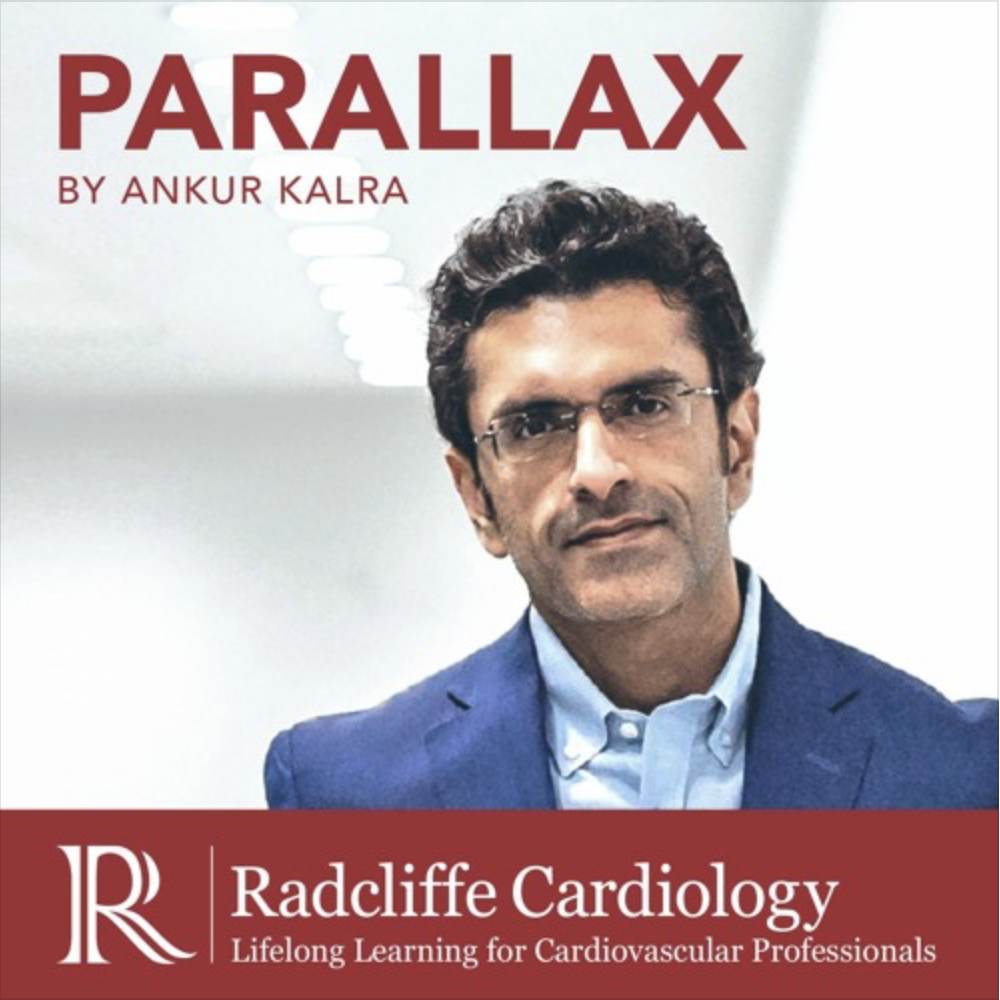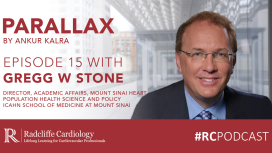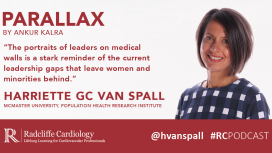
14: Establishing An Academic Career: A Discussion With Neal S Kleiman
Recorded on site at TCT, COAPT investigator Dr Neal Kleiman and Ankur discuss the realities of establishing an academic career as an interventional cardiologist. Neal explains why it is important to wear multiple hats and balance academia with a clinical presence.
Digging more into the practicalities of everyday work-life, Neal reflects on the challenges of reporting to multiple bosses who have different goals, and how geography enabled him to move between cathlab and academia. Neal also shares what he looks for in early career academic cardiologists. Submit your question to Ankur via: podcast@radciffe-group.com.
Hosted by @AnkurKalraMD. Produced by @RadcliffeCARDIO.
Read MoreRead Less

How did Gregg from Cleveland, Ohio become Gregg W Stone MD, world-leading interventional cardiologist and clinical trialist? This week, Ankur had the pleasure of speaking to Gregg about his personal and professional journey through the ‘golden years’ of interventional cardiology.
Gregg also shares his tips on how to progress from clinical practice to academic research, and what it takes to be a successful clinical investigator. Finally, Gregg shares with Ankur what personality traits he looks for in mentees and why presenting a final project is not enough. Submit your question to Ankur via: podcast@radciffe-group.com.
Hosted by @AnkurKalraMD. Produced by @RadcliffeCARDIO.
Read More
Gregg also shares his tips on how to progress from clinical practice to academic research, and what it takes to be a successful clinical investigator. Finally, Gregg shares with Ankur what personality traits he looks for in mentees and why presenting a final project is not enough. Submit your question to Ankur via: podcast@radciffe-group.com.
Hosted by @AnkurKalraMD. Produced by @RadcliffeCARDIO.
All Episodes

Ankur is back with his second #AudioArticle! This week he spoke with Santiago Garcia from the Minneapolis Heart Institute about Santiago’s US Cardiology Review 13.1 article on the role of high-sensitivity cardiac troponin (hscTn) assays and their ability to rapidly rule in or rule out acute coronary syndrome (ACS) with improved sensitivity.
Chest pain is one of the most common reasons for an emergency room visit in the US, with almost 6 million ER visits annually, yet there is no consensus on how to compare the results from various hscTn assays. Tune in to hear Santiago outline the advantages and limitations of using hscTn as a standard biomarket to evaluate patients with suspected ACS in the ER.
Hosted by @AnkurKalraMD. Produced by @RadcliffeCardiology.
Read More
Chest pain is one of the most common reasons for an emergency room visit in the US, with almost 6 million ER visits annually, yet there is no consensus on how to compare the results from various hscTn assays. Tune in to hear Santiago outline the advantages and limitations of using hscTn as a standard biomarket to evaluate patients with suspected ACS in the ER.
Hosted by @AnkurKalraMD. Produced by @RadcliffeCardiology.

In our first episode, Ankur explains his vision for and inspiration to start ‘Parallax’, and speaks with Chad Kliger from Lenox Hill Hospital in New York about conduction abnormalities after transcatheter aortic valve replacement (TAVR/TAVI), a review article published in US Cardiology Review 13.1 Ankur and Chad look at conduction abnormalities after TAVR/TAVI with a focus on basic conduction system anatomy in relation to the aortic valve, the mechanism, incidence, predisposing factors for occurrence, impact on mortality and finally, proposed treatment algorithms for management. Hosted by @AnkurKalraMD. Produced by @RadcliffeCardiology.
Read More

Following the recent controversy surrounding physician portraits displayed in medical hallways, Ankur spoke to Harriette GC Van Spall MD to unpick this hot topic brought back to life by a recent article penned by Jeffrey Flier (former Dean of Harvard Medical School) in The Boston Globe.
Harriette is an Associate Professor of Medicine at the Department of Medicine, Cardiology and the Department of Health Research Methods, Evidence and Impact at McMaster University and the Population Health Research Institute in Hamilton, ON, Canada. In this episode, Ankur and Harriette discuss why this issue is so contentious, what the current state of medical walls represents, why this may be an issue and what alternative medical walls could look like. Harriette also shares her thoughts on how this topic relates to the maintenance of hierarchical power structures in academic institutions, calling for more collaborative leadership and management styles. Guest @hvanspall.
Hosted by @AnkurKalraMD. Produced by @RadcliffeCARDIO.
Read More
Harriette is an Associate Professor of Medicine at the Department of Medicine, Cardiology and the Department of Health Research Methods, Evidence and Impact at McMaster University and the Population Health Research Institute in Hamilton, ON, Canada. In this episode, Ankur and Harriette discuss why this issue is so contentious, what the current state of medical walls represents, why this may be an issue and what alternative medical walls could look like. Harriette also shares her thoughts on how this topic relates to the maintenance of hierarchical power structures in academic institutions, calling for more collaborative leadership and management styles. Guest @hvanspall.
Hosted by @AnkurKalraMD. Produced by @RadcliffeCARDIO.

In celebration of this month’s ‘National Eat Your Vegetables Day’, this week’s guest is @TheVeggieMD, one of the most prominent physicians on social media! Dr Danielle Belardo MD is a Cardiology Fellow, American Board of Internal Medicine certified and a member of the American College of Cardiology Nutrition and Lifestyle Sub-Committee.
In this episode, Ankur and Danielle speak about the evidence in favour of a whole-food plant-based diet to improve cardiovascular health, the ACC prevention guidelines, how to talk to patients about positive dietary change, the issue of lack of nutrition training in cardiovascular fellowships and what Danielle’s diet looks like as a busy whole-food plant-based cardiology fellow. On her own podcast ‘Nutrition Rounds’ Danielle has discussions about evidence-based plant-based nutrition with physicians who are leading experts in nutrition and health.
Hosted by @AnkurKalraMD. Produced by @RadcliffeCardiology.
Read More
In this episode, Ankur and Danielle speak about the evidence in favour of a whole-food plant-based diet to improve cardiovascular health, the ACC prevention guidelines, how to talk to patients about positive dietary change, the issue of lack of nutrition training in cardiovascular fellowships and what Danielle’s diet looks like as a busy whole-food plant-based cardiology fellow. On her own podcast ‘Nutrition Rounds’ Danielle has discussions about evidence-based plant-based nutrition with physicians who are leading experts in nutrition and health.
Hosted by @AnkurKalraMD. Produced by @RadcliffeCardiology.

Listen to our first episode with two guests! Ankur spoke with Emmanouil S Brilakis, MD and Michael Megaly, MD from the Minneapolis Heart Institute, Abbott Northwestern Hospital about their article on the role of drug-coated balloons in small-vessel coronary artery disease (SVD) published in US Cardiology Review 13.1. Percutaneous coronary intervention of SVD remains challenging due to difficulties with device delivery and high restenosis rate, making drug-coated balloons an attractive emerging option in patients with SVD.
In this brilliant conversation, Ankur, Emmanouil and Michael unravel the potential advantages, challenges and practical realities of using drug-coated balloons in SVD, and the findings of the latest randomised controlled trials studying this area.
Hosted by @AnkurKalraMD. Produced by @RadcliffeCardiology. [Disclaimer: The use of drug-coated balloons in coronay intervention is still off-label; it has not been approved by the FDA.]
Read More
In this brilliant conversation, Ankur, Emmanouil and Michael unravel the potential advantages, challenges and practical realities of using drug-coated balloons in SVD, and the findings of the latest randomised controlled trials studying this area.
Hosted by @AnkurKalraMD. Produced by @RadcliffeCardiology. [Disclaimer: The use of drug-coated balloons in coronay intervention is still off-label; it has not been approved by the FDA.]

We have observed a lot of developments in percutaneous coronary intervention (PCI) over the past 12 months with the publication of various studies and trials. This week, Ankur spoke with J. Dawn Abbott, MD, Associate Professor of Cardiology at Warren Medical School of Brown University about her recently published US Cardiology Review 13.1 article on the significant developments in PCI over the past 12 months.
Dawn is an associate editor of the journal Circulation: Cardiovascular Interventions and is widely known for her research program on PCI and peripheral arterial disease (PAD). Ankur and J. Dawn discuss multiple trials/studies that were published in 2018, including ORBITA, PIONEER-II and ABSORB. J. Dawn also shares her thoughts on the latest stent technologies.
Hosted by @AnkurKalraMD. Produced by @RadcliffeCardiology.
Read More
Dawn is an associate editor of the journal Circulation: Cardiovascular Interventions and is widely known for her research program on PCI and peripheral arterial disease (PAD). Ankur and J. Dawn discuss multiple trials/studies that were published in 2018, including ORBITA, PIONEER-II and ABSORB. J. Dawn also shares her thoughts on the latest stent technologies.
Hosted by @AnkurKalraMD. Produced by @RadcliffeCardiology.

This week’s podcast guest needs no introduction! Prof Athena Poppas is one of the most widely known cardiologists in the US and current Vice-President of the American College of Cardiology! Ankur spoke to Athena about her recently published US Cardiology Review 13.1 article on whether early management of hypertension by GPs can improve outcomes.
They discuss the importance of preventative medicine, their experience of reducing hypertension with non-pharmaceutical and pharmaceutical methods, and the significance of the integrated “team approach” when treating comorbid conditions such as hypertension. Athena also shares her thoughts on cardiologists’ responsibility to shape their patients’ lifestyle choices.
Hosted by @AnkurKalraMD. Produced by @RadcliffeCardiology.
Read More
They discuss the importance of preventative medicine, their experience of reducing hypertension with non-pharmaceutical and pharmaceutical methods, and the significance of the integrated “team approach” when treating comorbid conditions such as hypertension. Athena also shares her thoughts on cardiologists’ responsibility to shape their patients’ lifestyle choices.
Hosted by @AnkurKalraMD. Produced by @RadcliffeCardiology.





